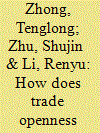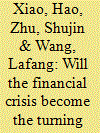| Srl | Item |
| 1 |
ID:
090796


|
|
|
|
|
| Publication |
2009.
|
| Summary/Abstract |
This paper proposes a new insight that the technology gap plays double-edged roles in the technology spillovers of foreign direct investment (FDI) through two channels, technology choice set and technology absorptive capability. Applying a multiple-threshold model, we examine the non-linear relationship between the technology gap and technology spillovers based on the provincial panel data of the Chinese industrial sector during 1993-2006. The empirical results support the hypothesis of two thresholds, which are 0.3071 and 0.5214 in terms of the technology gap respectively. The estimated thresholds indicate the sufficient absorptive capability is the premise for FDI technology spillovers. Moreover, it implies the marginal decrease of FDI technology spillover effects in the long run.
|
|
|
|
|
|
|
|
|
|
|
|
|
|
|
|
| 2 |
ID:
153057


|
|
|
|
|
| Summary/Abstract |
This paper investigates the effect of trade openness and other variables on the demographic transition in China using the instrumental variables regression method based on provincial panel data for the period between 1981 and 2013. The results indicate that trade openness is one of the determinants of China's demographic transition and has two distinct effects: (i) an income effect that accelerated the demographic transition by increasing per capita income; and (ii) a human capital effect that suppressed the demographic transition by reducing human capital accumulation. The effects of trade on demographic transition vary across different regions. This study identifies the important determinants of demographic transition in China's regions, and has rich policy implications for demographic transition and the upgrading of trade structure.
|
|
|
|
|
|
|
|
|
|
|
|
|
|
|
|
| 3 |
ID:
093652


|
|
|
|
|
| Publication |
2009.
|
| Summary/Abstract |
Following the substantial damage from the financial crisis in 2008, can China's auto industry successfully take up new challenges and grasp the opportunities ahead? First and foremost, this paper summarises the ways that the financial crisis has impacted upon China's economy. By analysing the impacts based on the MCHUGE model, the paper concludes that reductions in export demand and consumption expectations have limited impact on China's auto industry, while the comparative reduction in investment expectations has a great impact on China's auto industry. The paper builds the MCHUGE model with imperfect competition in order to assess whether China's auto industry, characterised as an oligopoly, could successfully accept such a challenge. The conclusion of this paper indicates that the damage to China's auto industry caused by the financial crisis would appear even more serious if the static effect of an oligopoly was the only consideration. Finally, by simulating the implementation of the Revitalisation Plans of the Automobile Industry, it is concluded that the revitalisation policy aims to boost auto consumption and will thus bring new opportunities for China's auto industry; on the other hand, the mergers and acquisitions between and among auto industries, as well as the relevant potential technology progress and the popularisation of new energy automobiles, will further promote the development of China's auto industry.
|
|
|
|
|
|
|
|
|
|
|
|
|
|
|
|